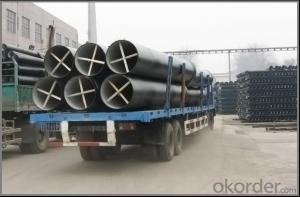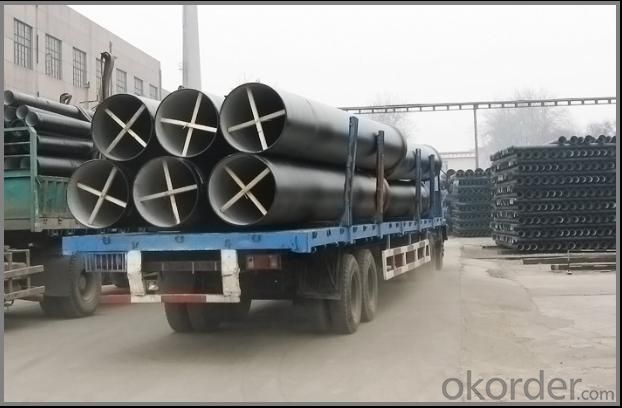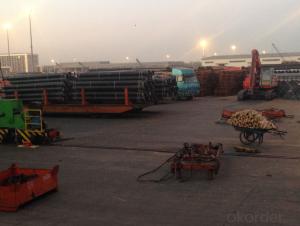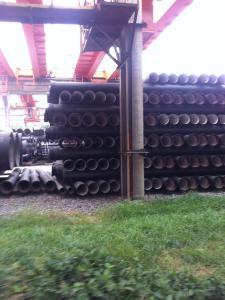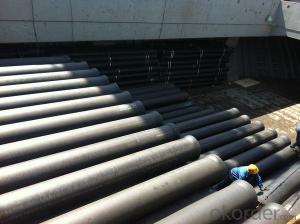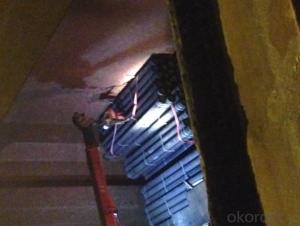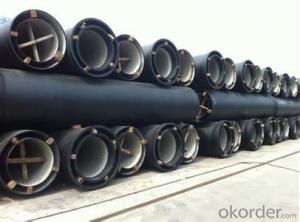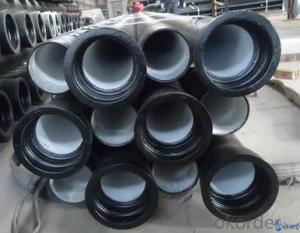DUCTILE IRON PIPES AND PIPE FITTINGS DN100
- Loading Port:
- Tianjin
- Payment Terms:
- TT OR LC
- Min Order Qty:
- 25 m.t
- Supply Capability:
- 30000 m.t/month
OKorder Service Pledge
OKorder Financial Service
You Might Also Like
Material : Ductile Cast Iron
Size Range : DN 80mm to DN 2000mm
Unit Effective Length : 6m or 5.7m
Manufacture Standard: ISO 2531:1998/ EN 545:2006/EN 598:2007
Annual capacity : 200,000 tons
Coating Exterior: Zinc 130g/m2 according to ISO 8179-1 and bitumen coating 70 microns.
Cement Interior: Portland Cement/ High Alumina Cement/ Sulphate Resisting Cement Lining according to ISO 4179
Special requirements on external coating and internal lining can be applied
We also provide accessories such as SBR/EPDM rubber gaskets, lubricant paste, pipe caps, PE sleeves, etc.
Additional Parts:
Each pipe is strictly inspected according to related standard to ensure permanently high performance.
Easy Installation at site and service free for life
Long Service Lifespan
Quotation will arrive you within 24hours once we get your inquiry.
We guarantee offering you a competitive price.
A copy of original inspection reports of pipes will be offered after shipment.
Photos of loading process will be sent to the customer after shipment effect.
We will follow-up the delivery progress after shipment effect and update to the customer on weekly basis.
- Q: Are ductile iron pipes suitable for industrial water systems?
- Ductile iron pipes, well-known for their strength, durability, and resistance to corrosion, are a perfect choice for industrial water systems. With the capability to withstand high-pressure and heavy-duty applications, these pipes are ideal for transporting water in large-scale industrial facilities like power plants, factories, and chemical plants. Moreover, ductile iron pipes can handle a broad range of temperatures, making them suitable for both hot and cold water systems. Their inherent flexibility allows for easy installation and maintenance, enhancing their suitability for industrial water systems. In conclusion, ductile iron pipes offer a dependable and economical solution for industrial water transportation requirements.
- Q: Can ductile iron pipes be repaired if they are damaged?
- Yes, ductile iron pipes can be repaired if they are damaged. Various repair methods, such as spot repair or full line replacement, can be employed depending on the extent and nature of the damage. Experienced technicians can assess the damage and determine the most suitable repair technique to restore the functionality and integrity of the ductile iron pipes.
- Q: Are ductile iron pipes suitable for installation in areas with high soil compaction?
- Indeed, areas with high soil compaction can accommodate the installation of ductile iron pipes. Renowned for their robustness and longevity, ductile iron pipes exhibit remarkable resistance against external loads and pressures. Their inherent pliability enables them to endure the strains caused by intense soil compaction. Furthermore, ductile iron pipes possess a substantial modulus of elasticity, enabling them to retain their form and structural soundness even when subjected to substantial burdens. Consequently, they present themselves as an exceptional option for regions with high soil compaction, as they adeptly manage the force and deliver dependable and enduring functionality.
- Q: How does ductile iron pipe perform in areas with high groundwater levels?
- Ductile iron pipe performs exceptionally well in areas with high groundwater levels. One of the key advantages of ductile iron pipe is its corrosion resistance, which makes it highly suitable for underground applications and areas with high water tables. Unlike other materials, ductile iron pipe is not susceptible to rust or corrosion caused by groundwater, ensuring its durability and longevity. Furthermore, ductile iron pipe has excellent strength and flexibility, allowing it to withstand the external pressure exerted by high groundwater levels. It can resist the buoyant forces exerted by water, preventing it from floating or shifting out of place. In addition, ductile iron pipe's joints are tightly sealed, preventing any groundwater from infiltrating the pipe system. This ensures that there is no leakage or contamination of the water supply, which is crucial in areas with high groundwater levels. Overall, ductile iron pipe is the ideal choice for areas with high groundwater levels due to its corrosion resistance, strength, and ability to maintain a tight, secure system. It provides a reliable and long-lasting solution for water distribution and sewer systems, even in challenging environments.
- Q: What is the expected joint flexibility of ductile iron pipes?
- The expected joint flexibility of ductile iron pipes is typically high, as they are designed to accommodate slight movements and stresses caused by ground settlement or thermal expansion and contraction.
- Q: What is the expected thermal expansion of ductile iron pipes?
- The expected thermal expansion of ductile iron pipes can vary depending on several factors such as the specific composition of the iron, the temperature range, and the length of the pipe. However, in general, ductile iron pipes have a coefficient of thermal expansion ranging from 10 to 13 microinches per inch per degree Fahrenheit (µin/in/°F). This means that for every one degree Fahrenheit increase in temperature, the ductile iron pipe will expand by approximately 10 to 13 microinches per inch in length. It is important to note that this value is an estimate and may vary slightly depending on the specific conditions and characteristics of the pipe.
- Q: Can ductile iron pipes be used for railway crossings?
- Yes, ductile iron pipes can be used for railway crossings. Ductile iron is a strong and durable material that can withstand heavy loads and high traffic volumes, making it suitable for railway crossings. Additionally, it has excellent corrosion resistance properties, which is important for withstanding the harsh environmental conditions associated with railway crossings.
- Q: Are there any alternatives to ductile iron pipe for water distribution?
- There are various options available for water distribution besides ductile iron pipe. Some commonly used alternatives include: 1. PVC (Polyvinyl Chloride) Pipe: PVC pipe is frequently chosen for water distribution due to its affordability, durability, and resistance to corrosion. It is lightweight, easy to install, and requires minimal maintenance. 2. HDPE (High-Density Polyethylene) Pipe: HDPE pipe is a flexible and durable choice for water distribution. It is resistant to corrosion, chemicals, and UV rays, making it suitable for both aboveground and underground installations. HDPE pipe is also known for its leak-free joints and long lifespan. 3. PEX (Cross-linked Polyethylene) Pipe: PEX pipe, a flexible plastic pipe, is commonly utilized for water distribution in residential and commercial settings. It is recognized for its ability to withstand freezing, scaling, and corrosion. PEX pipe is easy to install, has fewer joints, and is highly durable. 4. Copper Pipe: Copper pipe has a long history of use in water distribution due to its exceptional resistance to corrosion and extended lifespan. Although it is more expensive than other alternatives, copper pipe is renowned for its reliability and ability to handle high pressure. 5. Steel Pipe: Steel pipe is a robust and durable option for water distribution, particularly in high-pressure scenarios. It can endure extreme temperatures and resist external loads. However, steel pipe is more costly and requires specialized installation techniques. When selecting an alternative to ductile iron pipe for water distribution, it is crucial to consider factors such as cost, durability, corrosion resistance, installation requirements, and specific project needs.
- Q: Can ductile iron pipes be used for road and highway drainage?
- Yes, ductile iron pipes can be used for road and highway drainage. Ductile iron pipes have excellent strength and durability, making them suitable for handling the heavy loads and traffic associated with road and highway drainage systems. Additionally, they have high resistance to corrosion and provide a smooth internal surface, minimizing the chances of blockages and ensuring efficient water flow.
- Q: How can the ductile iron pipe be welded?
- If the hole on the ductile iron pipe, you can use special hoop lined flexible rubber ring, rubber ring and pipe wall coating with rubber ring, glue to be fixed.
Send your message to us
DUCTILE IRON PIPES AND PIPE FITTINGS DN100
- Loading Port:
- Tianjin
- Payment Terms:
- TT OR LC
- Min Order Qty:
- 25 m.t
- Supply Capability:
- 30000 m.t/month
OKorder Service Pledge
OKorder Financial Service
Similar products
Hot products
Hot Searches
Related keywords
